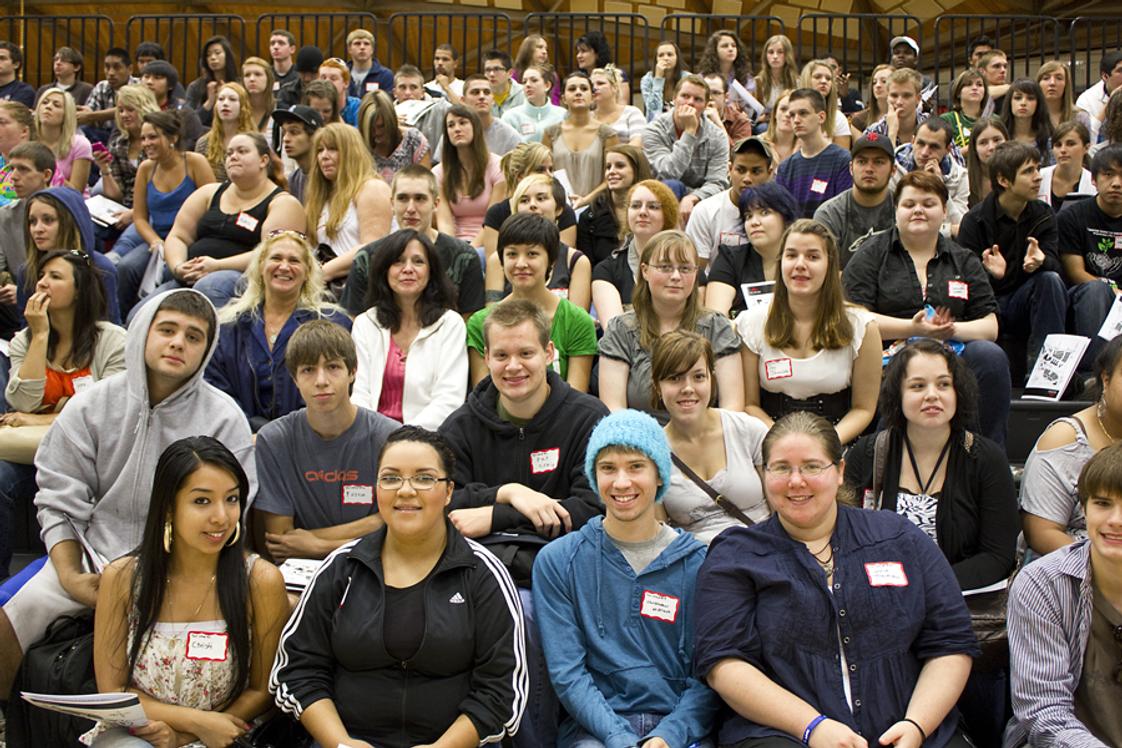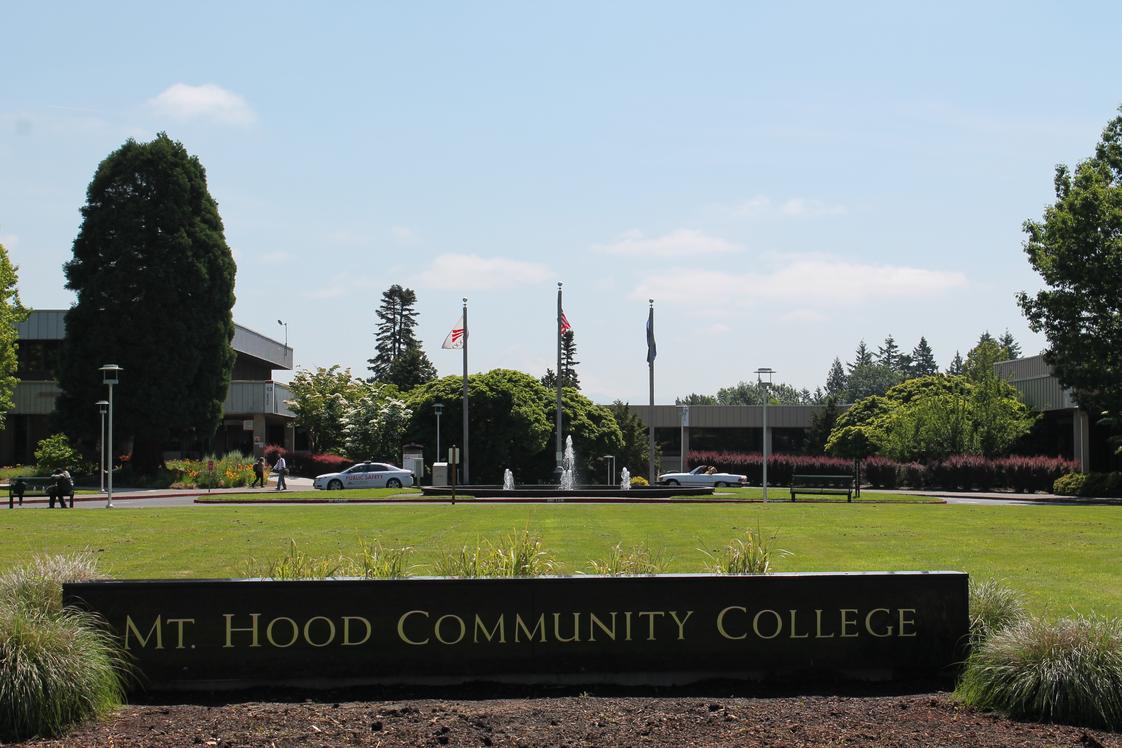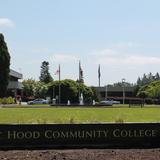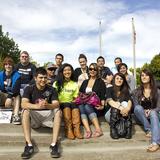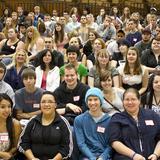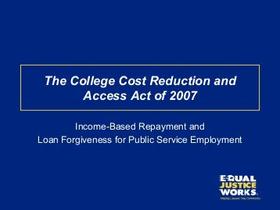- Mt. Hood Community College (MHCC) offers a variety of unique, flexible education options to a highly diverse student body. Situated in the beautiful foothills of Mt. Hood, we empower students to accomplish short- and long-term goals with regionally unique degree programs, public classes and events, high-contact advising, and an array of resources for students' basic needs. As a community hub for cultural, economic, recreational, and intellectual enrichment, we're committed to advancing equity, building responsible partnerships, and supporting every student's personal and professional growth. Visit our website to learn more about Your Community's College at www.mhcc.edu/.
School Highlights
Mt Hood Community College serves 18,935 students (7% of students are full-time).
The college's student-teacher ratio of 45:1 is higher than the state community college average of 21:1.
Minority enrollment is 58% of the student body (majority Hispanic), which is more than the state average of 47%.
Quick Facts (2025-26)
- Enrollment: 18,935 students
- In-state tuition: $5,247
- Out-state tuition: $9,000
- Acceptance Rate: 100%
- Student-teacher ratio: 45:1
- Minority enrollment: 58%
- Source: Verified school update
Top Rankings
Mt Hood Community College ranks among the top 20% of public schools in Oregon for:
School Overview
The teacher population of 423 teachers has grown by 48% over five years.
Mt Hood Community College
(OR) Community College Avg.
Carnegie Classification
Associates Colleges
Not applicable, not in Carnegie universe (not accredited or nondegree-granting)
Institution Level
Less than 2 yrs
At least 2 but less than 4 years
Institution Control
Public
Private not-for-profit
Total Faculty
423 staff
192 staff
Student Body
The student population of Mt Hood Community College has declined by 32% over five years.
The student-teacher ratio of 45:1 has increased from 24:1 over five years.
The Mt Hood Community College diversity score of 0.73 is more than the state average of 0.66. The school's diversity has grown by 5% over five years.
Total Enrollment
18,935 students
2,463 students
Student-Teacher Ratio
45:1
21:1
# Full-Time Students
1,385 students
310 students
# Part-Time Students
17,550 students
2,153 students
# Enrollment Undergraduate
322 students
339 students
# Full-Time Undergraduate Students
18,935 students
310 students
# Full-Time Graduate Students
n/a
193 students
# Part-Time Undergraduate Students
4,407 students
2,589 students
# Part-Time Graduate Students
n/a
153 students
Total Dormitory Capacity
n/a
270 students
% American Indian/Alaskan
1%
1%
% Asian
6%
5%
% Hispanic
21%
20%
% Black
5%
3%
% White
42%
53%
% Hawaiian
n/a
1%
% Two or more races
4%
5%
% Non Resident races
1%
1%
% Unknown races
20%
11%
Diversity Score
0.73
0.66
College Completion Rate (Students who graduate in less than 4 years)
26%
42%
College Completion Rate (Students who graduate in 4 years or more than 4 years)
n/a
58%
Average Graduate Earnings (10 Years)
$37,100
$33,800
Tuition and Acceptance Rate
The public in-state tuition of $5,247 is more than the state average of $4,172. The in-state tuition has stayed relatively flat over four years.
The public out-state tuition of $9,000 is more than the state average of $6,738. The out-state tuition has declined by 10% over four years.
In-State Tuition Fees
$5,247
$4,172
Out-State Tuition Fees
$9,000
$6,738
Tuition Notes
The tuition rates includes services and fees for 3 terms.
% Students Receiving Some Financial Aid
33%
79%
Median Debt for Graduates
$12,933
$12,875
Median Debt for Dropouts
$5,673
$6,334
Acceptance Rate
100%
100%
Sports
Total Sports Offered
6 sports
Sports
BaseballBasketball
Cross CountrySoftball
Track and FieldVolleyball
Source: 2024 (or latest year available) Integrated Postsecondary Education Data System (IPEDS) , School Administrators
School Notes
- Being a student at Mt. Hood Community College means making changes and adjustments and adding new responsibilities to your daily lifestyle. The flexibility of a two-year college allows you to attend part-time or full-time, day, evening, or weekend classes, as well as distance learning classes. MHCC costs less than a four-year college or university and allows you to transfer to a four-year college or university if you wish to earn your bachelor`s degree. Your learning techniques and personal life schedule will determine if full-time or part-time enrollment suits you best. Our advisors are here to help you decide which is best to achieve your educational goals.
- Sample of notable school alumni/alumnae:
- Richard L. Anslow - Notable physicist and science advocate - 1971 -
- Lisa Anderson - Award-winning author and public speaker - 1985 -
Frequently Asked Questions
How much does Mt Hood Community College cost?
Mt Hood Community College's tuition is approximately $5,247 for In-State students and $9,000 for Out-State students.
What schools are Mt Hood Community College often compared to?
Mt Hood Community Collegeis often viewed alongside schools like Portland Community College, Clackamas Community College by visitors of our site.
What is the acceptance rate of Mt Hood Community College?
The acceptance rate of Mt Hood Community College is 100%, which is equal to the state average of 100%.
Who are famous alumni from Mt Hood Community College?
Mt Hood Community College famous alumni include: Richard L. Anslow - Notable physicist and science advocate - 1971 and Lisa Anderson - Award-winning author and public speaker - 1985.
What sports does Mt Hood Community College offer?
Mt Hood Community College offers 6 interscholastic sports: Baseball, Basketball, Cross Country, Softball, Track and Field and Volleyball.
What is Mt Hood Community College's ranking?
Mt Hood Community College ranks among the top 20% of community college in Oregon for: Diversity in US community colleges and Largest student body.
In what neighborhood is Mt Hood Community College located?
Mt Hood Community College is located in the Northeast neighborhood of Gresham, OR.
Recent Articles

Community College Success Rates 2025: Outcomes & Trends
Updated 2025 analysis of community college success rates, completion, transfer, costs, enrollment, and strategies that shape student outcomes.

Community Colleges in 2025: Combating Stereotypes with Impact
Updated insights on how community colleges are dispelling myths, growing enrollment, and expanding pathways in 2025.

2025 FAFSA Changes Explained for Community College Students
A comprehensive guide to 2025 FAFSA changes, what community college students must know, new eligibility rules, timelines, and tips to maximize federal aid.

